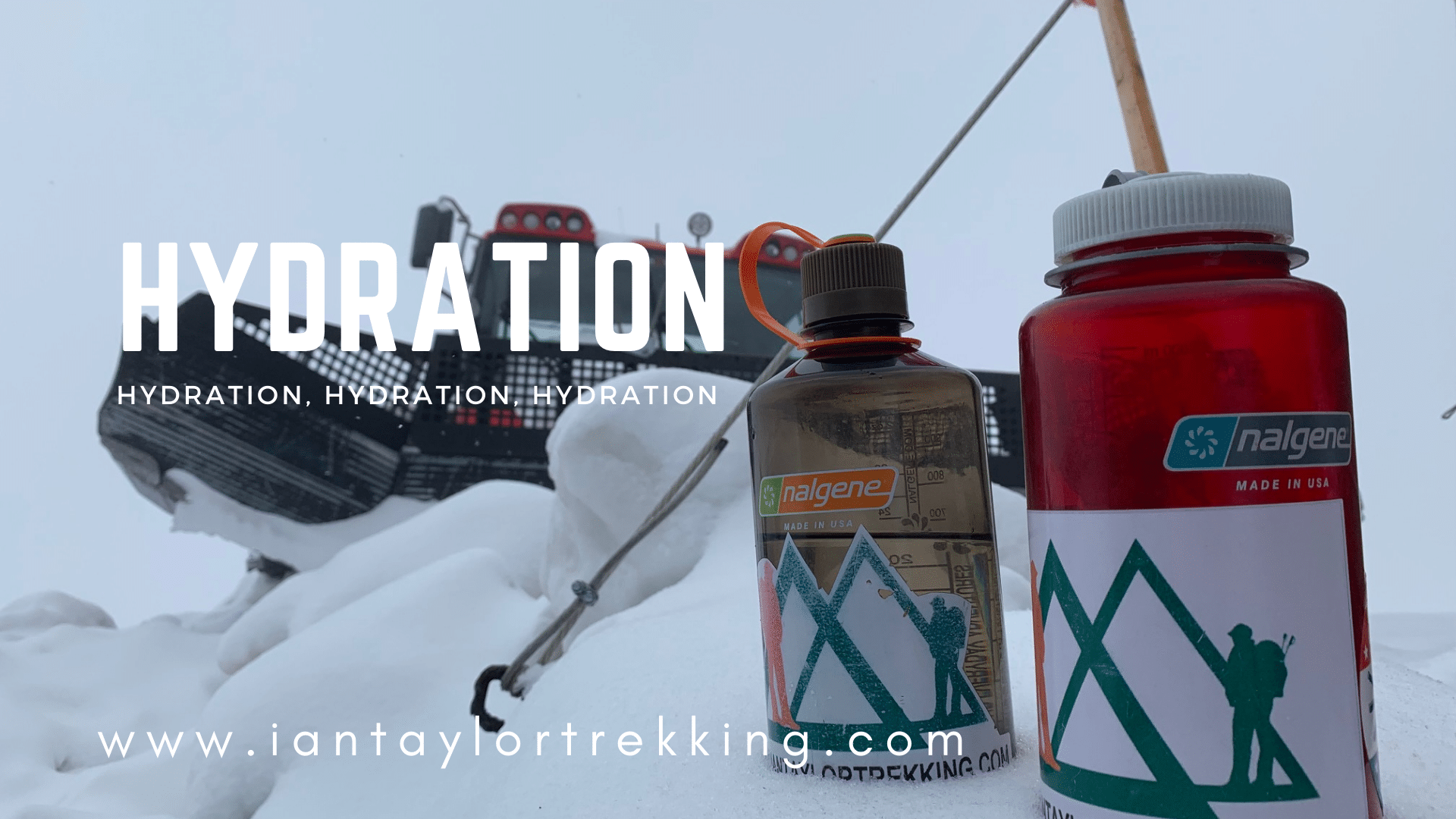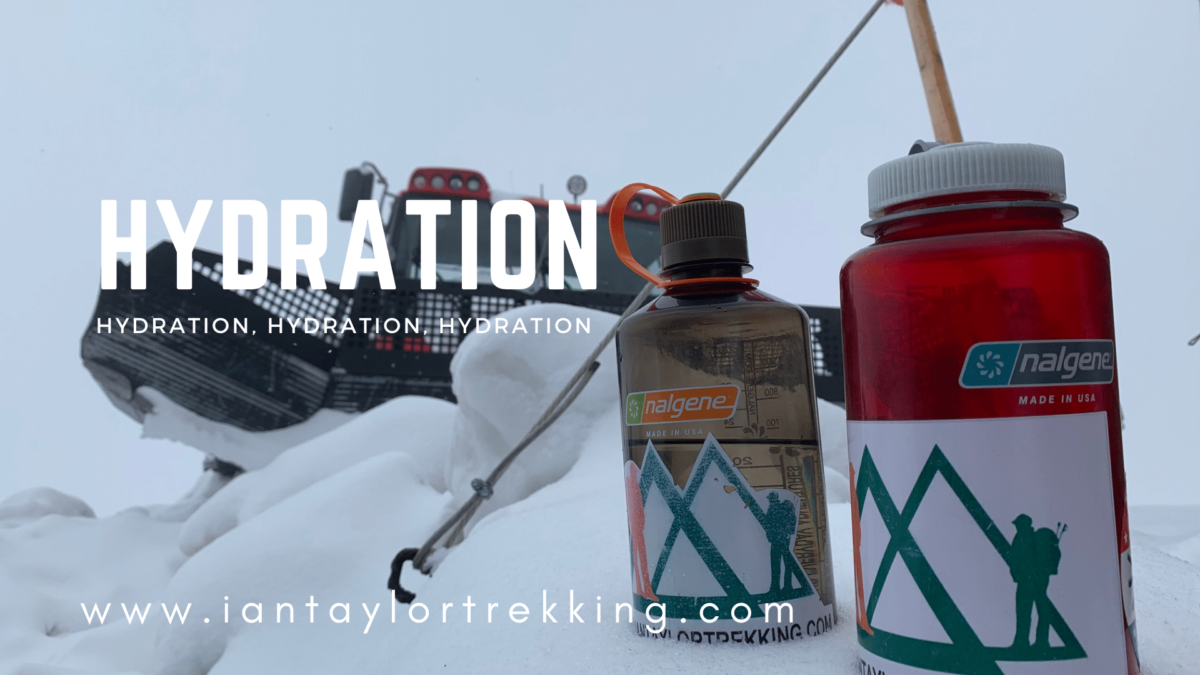Your Body Needs Water

Facts About the Importance of Water
1). Water increases the efficiency of red blood cells in collecting oxygen in the lungs. In other words, we need it for breathing. So personally, I run out of breath at altitude far before my legs give out.
2). Cells use water to energize and top off their reserves. Then, it leaves the body, carrying along with it the toxic waste of the cells. This is done through urination, sweat, bowel movements, and even our breath.
3). Water is the main solvent for all foods, vitamins, and minerals. In order to metabolize and assimilate nutrients, water is used to breakdown food into smaller particles.
4). Water is essential for our body’s cooling (sweat) and heating systems. Believe me, I know this from personal experience! If I am not well hydrated, and it is hot outside, and I am working hard carrying my loaded pack up a steep ravine (or even on a slightly upward path) my energy level drops dramatically. It has been said that you can lose as much as 25% of your strength if you get down just a pint of water when working hard doing any physical activity!
5). Water is even used in the spinal discs to make them shock-absorbing water cushions and is the main lubricant in the joint spaces. Water helps prevent arthritis and back pain. Not much to say here. Now there are many reasons why our joints break down, but knowing this fact should encourage us to keep hydrated so we can do all we can to help keep our back and joints in the best working condition as possible. Painful knees and back can interfere with our mountaineering pleasure.
Factors That Influence Water Needs
Did you know that temperature, activity level, humidity, how much you sweat, breathing, urine, bowel movements, your physical condition, and even your gender (just to name a few), all come into play when it comes to how much water you are going to lose on any given outing? Now lets discuss some other variables that you may encounter out there while hiking, climbing and mountaineering.
Altitude
High elevation affects the hiker/climber in three ways when it comes to hydration and remember that it takes the body a long time to acclimatize to high altitude. You want to make sure you are choosing the right itinerary for your trek to Everest Base Camp or Kilimanjaro
1). Loss of water due to dryer air. As you go higher, the temperature drops, and cold air holds less moisture then warm air.
2). Loss of water due to more frequent urination. As the body acclimates to higher altitude (for most this means an altitude greater then 8,200 feet), one urinates more often as the body works to avoid respiratory alkalosis (elevated blood PH) by your kidneys excretion of bicarbonate. In time, the body adjusts and alkalosis is no longer a problem once the hiker/climber becomes acclimated. Also, in very cold temperatures, the body wants to eliminate fluid by urination so it does not have to expend energy heating it. So we are more likely to lose fluid through urination in cold weather.
3). Loss of water through rapid breathing (and increased heart rate). This is due to lower oxygen concentration at higher altitudes. The body tries to compensate by taking in oxygen more frequently by breathing rapidly. Over time as the red blood cell density increases, breathing and heart rates return to normal.
Climate
Hot or humid weather can make you sweat more. Sweat can not evaporate and cool you as quickly as it normally does when the air is humid. This can result in higher body temperature and the need for more fluids. Conversely in cold climates there is less moisture in the air requiring additional intake of fluid to replace fluid loss.
Level of Activity
Speed of activity, grade, difficulty of terrain, and the amount of weight carried, all have an influence on how much water you will need. It is pretty obvious that the pace of the activity and the amount of weight carried has a direct impact on the energy and water needed for the outing. However, not always so obvious, is how much extra work it is to ascend even a slight hill in comparison to traveling on level terrain.
I learned this principle years ago when doing a lot of cycling, and it proves to be true for hiking too. The difficulty of the terrain also has a profound influence on how much you should drink. If you get into rocky terrain and have to use your hands or upper body for balance, you will need more water. The rule of thumb is, the more muscle groups that you use, the more energy and thus more water you will need. So the bottom line is that you will need extra water if you are traveling fast, or in steep and/or difficult terrain.
So How Much Water do I Need to Drink a Day
I hear it all the time; “just drink 8 ounces of water 8 times a day, and you’ll be fine.” Right? Well that all depends on all the water loss factors we talked about earlier.
Lets Start with Some Basic Facts
1). Women require 9 eight oz cups of water/day on average
2). Men require 13 eight oz cups of water/ day on average.
However, remember that individuals sweat and breath at different rates. Therefore, there is no way to have a hard and fast rule for everyone. (the above is the findings of the Institute of Medicine)
How Much Water Should You Drink
If you engage in any activity that makes you sweat, you will need to drink extra water to compensate for the fluid loss. An extra 1.5 to 2.5 cups of water should suffice for short bouts of exertion. If the level of activity becomes intense, lasting more than an hour (such as hiking on a sustained uphill grade), then this will require more fluid intake. How much additional fluid you need will depend on water loss during the outing.
If you start your outdoor activity well hydrated, then it is recommended to drink 8 ounces every half hour of sustained activity. Followed by 8-16 ounces of water after the outing. When we are hiking long distances, it is preferred to constantly sip water, instead of ‘chugging’ large gulps of water at once. If you think of a hospital drip, it is constantly drip-feeding the patient with fluids. They are not pouring them in all at once.
Hydration for a Safe and Successful Journey
One rule of thumb to remember is that the longer you exercise, the more difficult it is to stay hydrated. For those of you who are going out for a period of a few days, your fluid debt increases with time; be mindful that you need to replace the fluid you lose on a daily basis, as dehydration is cumulative. Follow us in Instagram.

